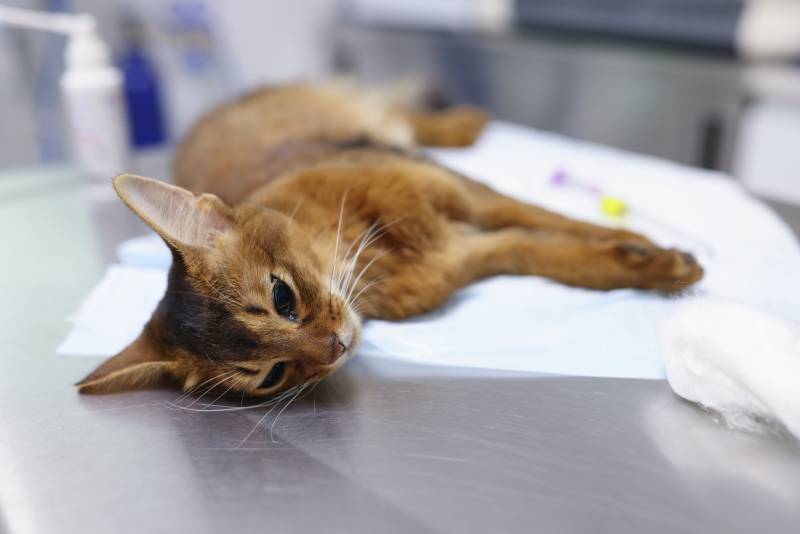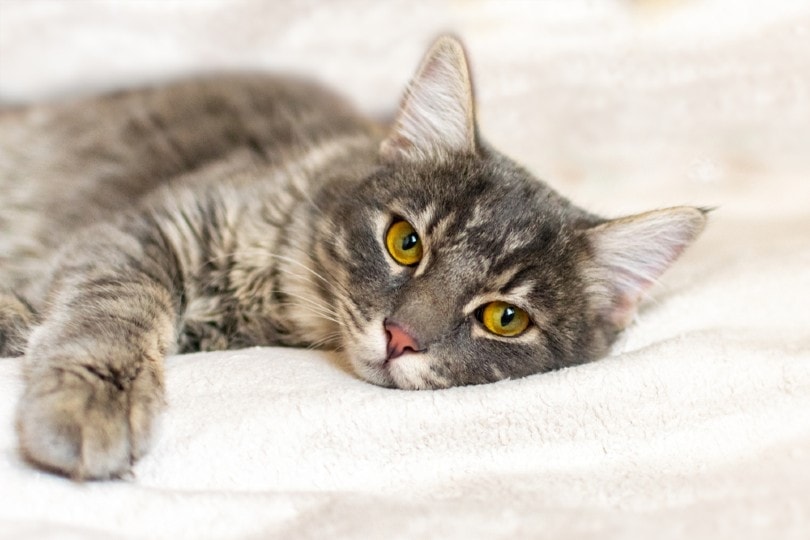Kidney Stones In Cats: Signs, Causes, & Care (Vet Answer)
By Dr. Kim Podlecki, DVM (Vet)
Updated on

Click to Skip Ahead
Kidney stones in cats are a condition that may go undiagnosed for a while. It’s more typical to find stones that form within the bladder of cats than stones that form within the kidneys. However, kidney stones do occur, and your cat may not show any abnormal signs until they are very sick. Because there are two kidneys, the unaffected kidney may compensate, hiding any issues in your cat for long periods of time.
Continue reading to learn more about kidney stones in your cat, what causes them, and what you can do if your cat has them.
What Are Kidney Stones?
Unless there is a rare congenital issue, CATS are born with two kidneys—one on each side of the abdomen. These kidneys each have an attachment to the bladder called a ureter. The kidneys filter blood, waste, and toxins from the body, creating urine. This then travels through the ureters into the bladder where it is eventually urinated out of the body. This is the cats’ way of filtering certain waste products from the body and safely eliminating them.
While rare, kidney stones can form in cats. They are small, mineral deposits that form within one or both kidneys. There are different types of stones that can form, each having their own mineral composition. Kidney stones are almost always composed of calcium oxalate. The stones form because the calcium oxalate minerals in the body exceed the threshold within the kidney. The deposits at first form tiny crystals, similar to sand. As the crystal deposits continue to build up, they form larger stones.

What Are the Signs of Kidney Stones?
Your cat may or may not have obvious signs of kidney stones. Because there are two kidneys, if only one is affected, the healthy kidney will compensate and pick up the slack. Therefore, your cat continues to eat, drink, and urinate normally. If the stone(s) is very small and there is no obstructive process, again you may not notice anything abnormal. However, if the stone becomes large and starts to cause obstruction within the kidney itself, this can then become very painful. This will also occur if the stone passes into a ureter and becomes stuck. The kidney is then unable to filter waste products properly and urine is unable to pass normally into the bladder. A backup of fluid and waste products then builds up in the kidney, causing the kidney to become severely enlarged. This will then cause severe abdominal pain, often accompanied by nausea, vomiting, and weakness.
If both kidneys are affected, this can be severely detrimental to your cat. Without either kidney able to do their job properly, waste products and urine will build up in your cat’s system. Over time, without the ability to eliminate these products through the urine, your cat may go into kidney failure or even pass away if certain toxin levels become too elevated.
What Are the Causes of Kidney Stones?
Kidney stones are caused by there being an increased amount of certain minerals within the body. The levels exceed the threshold that the kidney is able to filter and eliminate and will therefore form crystals and eventual stones.
Multiple studies have been done and are currently being done to determine the causes of the phenomenon of both kidney and bladder stones in cats. Links have been found to inactive housecats that do not take in enough fluids on a regular basis. Cats who only eat dry kibble and/or are not drinking enough to constantly flush their kidneys may be at increased risk of this condition.

How Do I Care for a Cat with Kidney Stones?
Once your cat has been diagnosed with kidney stones, you should monitor urine samples and bloodwork frequently. This will help determine if there are any concurrent infections and/or damage to the kidney’s ability to function properly. Depending on those results, your veterinarian will recommend how frequently these tests need to be monitored.
One of the most helpful things you can do for your cat is to provide lots of fresh water for them. Put different bowls in multiple areas of the house, and even try out different materials (e.g., glass, ceramic, metal) to see if there is a certain bowl your cat prefers. Some cats will also love a water fountain—just make sure you are cleaning these regularly so that they do not build up mold and bacteria!
Putting your cat on a food with a higher water content will also help. The addition of more water in the house and higher water content in the food will help the kidneys to “flush” more consistently. This will help to remove small amounts of mineral and other waste build-up before it becomes severe. If your cat won’t drink, you can add small amounts of tuna or chicken juice to the water to help tempt them. If your cat already has signs of kidney disease from bloodwork, your veterinarian may also want to put your cat on a prescription diet that helps to keep the kidneys functioning better for as long as possible.
Frequently Asked Questions (FAQs)
How Are Kidney Stones Diagnosed?
Your veterinarian should be able to see most kidney stones on a routine radiograph. There are some stone compositions that do not show up on radiographs (they are radiolucent), but these are extremely rare in cats, especially within the kidneys.
Your veterinarian will likely want a urinalysis to see if your cat has any signs of infection and/or crystals in their urine, bloodwork to monitor the kidney values and the kidneys’ ability to function properly, in addition to the radiographs to look for stones.

Can Kidney Stones Be Removed Surgically?
This is not a typical surgery that is recommended and/or performed on cats. If there are kidney stones diagnosed but the cat is not in pain, bloodwork is normal and they are still producing good urine, the stones are often just monitored. If the stones become stuck within the ureter and are obstructing the flow of urine, more aggressive care such as IV fluids, hospitalization, and medications to help increase urine output is recommended. Only in emergency situations would surgery typically be completed for this condition. This would also be a highly specialized surgery that typically only a Board-Certified Veterinary Surgeon would perform.
Will My Cat Die from Kidney Stones?
Kidney stones are not an automatic death sentence for your cat. As discussed, your cat should have two kidneys, and the other kidney will do a great job compensating and completing the task of making good urine. However, if your cat continues to form crystals and/or stones, this can put them at an increased risk for urinary obstruction—either in the ureters or the urethra. If your cat is unable to form and pass urine for a period of time, this can be a fatal condition.
Conclusion
Kidney stones, while rare, do occur in cats. They are almost always composed of calcium oxalate minerals and can start as small crystals, or sediment, and then progress to being larger stones. If the stones are within the kidney but not causing any obstruction of urine, they will typically be monitored. However, if the stones are causing any obstruction of the filtering and elimination of urine, your cat may become severely sick or even die from the condition.
Regular monitoring with your veterinarian is recommended to determine if and how much the kidneys are affected. Increasing your cat’s water intake and potentially putting them on a prescription urinary diet may also help their long-term kidney and urinary tract function.
Featured Image Credit: megaflopp, Shutterstock














